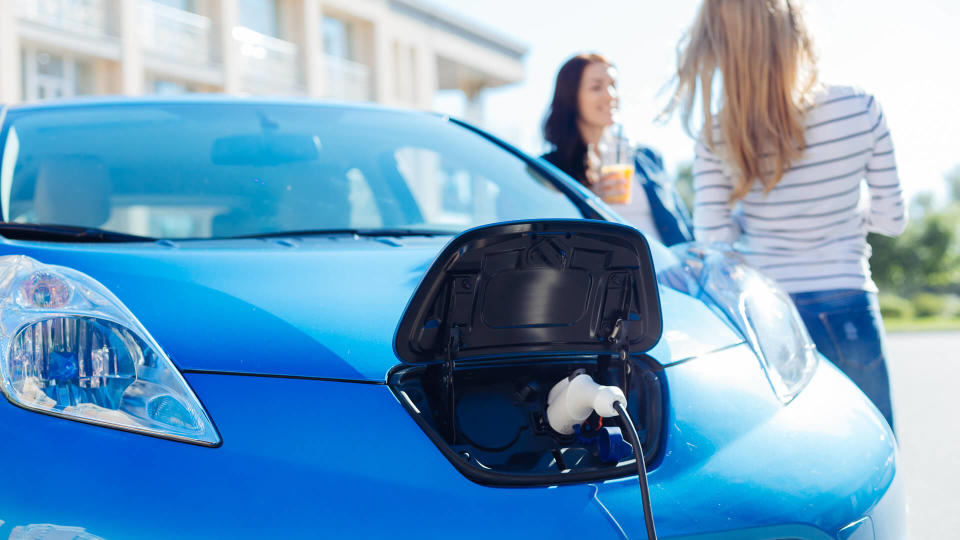Gen Z and Millennials Favor EVs, Survey Shows — What Does That Mean for the Future of Gas-Powered Vehicles?

The increasing popularity of electric vehicles (EVs) over gas-powered cars is no secret, especially among younger generations. A recent J.D. Power survey revealed that Gen Z is the fastest-growing segment for EV consideration, with millennials leading in overall consideration at 72% (that means most of them are at least thinking about getting an EV). What’s more, a separate GOBankingRates survey found that Gen Z reacts very favorably to EVs and a majority plan to make the switch within the next five years.
Look: 9 Best Hybrid Cars Under $30K If You’re Unable To Go Fully Electric
Learn: How To Save $200 on Your Grocery Bill Every Month
Why Are Gen Zers and Millennials So Into EVs?
EVs are cutting-edge and innovative, which naturally appeals to younger generations. Additionally, Gen Z is the first group of digital natives, making the allure of these cars even stronger. Beyond the tech appeal, the environmental and cost benefits of owning EVs strike a chord with younger customers.
Climate Impact
Younger generations are highly conscious of social justice and willing to pay more for products aligned with their values. They understand the severe impact of climate change and prioritize avoiding gas-powered vehicles to reduce their carbon footprint.
“Because of climate anxiety, 6 in 10 Gen Zers and millennials are willing to pay more for sustainable products and services according to Deloitte research,” said Peter Glenn, founder of EV Life, a fintech startup that helps EV buyers lower their monthly loan payments.
Switching to an electric vehicle is one of the most impactful steps individuals can take to combat climate change.
“Driving gas cars represents 25% of an average American’s carbon footprint,” Glenn said. “If every driver switched from gas to EVs, we’d reduce total U.S. carbon emissions by over 22%. For Gen Zers and millennials, reducing their climate impact by 22% is a price worth paying for a livable planet.”
Watch Out: 8 Electric Cars You May Regret Buying
Lower Operating Costs
While EVs may have higher upfront costs compared to gas-powered vehicles, Gen Zers and millennials are drawn to the long-term financial benefits of EV ownership.
“While the upfront cost of an EV may be higher, the overall cost of ownership can be lower due to reduced maintenance and fuel costs,” Glenn said. “According to Consumer Reports, the average American driver stands to save $800 to $1,000 a year on fuel costs by switching from gas to an electric vehicle.”
EV Vehicle Incentives
The initial cost of purchasing an EV may be a concern, but attractive tax benefits from federal, state and local governments can help customers get up to $7,500 back on their vehicle purchase.
“There are many policy incentives available that lower the cost of purchasing an EV,” said Kate Whitefoot, associate professor of mechanical engineering, engineering and public policy at Carnegie Mellon’s College of Engineering. “Not everyone is aware that many of these are available for used EVs as well, which may be attractive to Gen Z and millennials. The federal government offers a tax credit and many states offer additional rebates for purchasing used EVs as well as new EVs. “
How Will EV Popularity Affect the Price?
The transition from gas-powered to electric vehicles is rapidly accelerating, thanks to increasing demand and manufacturing capabilities. Experts predict that the growth of EVs will continue exponentially in the coming years.
“As with the advent of flat-screen TVs, at first, they were expensive whilst attractive and desirable, but then, once demand and adoption reached a certain point, mass production and competition allowed prices to drop, making them ubiquitous,” said Greg Beischer, CEO of Alaska Energy Metals Corporation. “This scenario is expected to play out for EVs. Within a decade, a very large percentage of vehicles will be electric and likely more affordable than they are today.”
What Does the Future Look Like for Gas-Powered Cars?
While gas vehicles won’t vanish overnight, the rapid growth of EVs is likely to cause a decline in the popularity and sales of gas-powered vehicles. As EV infrastructure improves and battery technology advantages to offer longer ranges at lower prices, the market share of gas-powered vehicles is expected to plummet.
“The automotive industry is shifting to grow their EV offerings dramatically,” Whitefoot said. “It’s anticipated that EV market share among new vehicles will grow to 50% or more within the next decade. But, vehicles have long lifetimes, and it will take a while before the majority of all vehicles on the road are EVs.”
EVs Will Benefit From the Banning of New Gas Cars
“California — the country’s largest vehicle market — has banned the sale of new gas vehicles by 2035,” Glenn said. “To date, Maryland, Massachusetts, New Jersey, New York, Oregon and Washington have also passed gas car bans by 2035 or earlier. These regulations will further incentivize consumers to choose EVs over gas-powered cars.”
More From GOBankingRates
This article originally appeared on GOBankingRates.com: Gen Z and Millennials Favor EVs, Survey Shows — What Does That Mean for the Future of Gas-Powered Vehicles?
